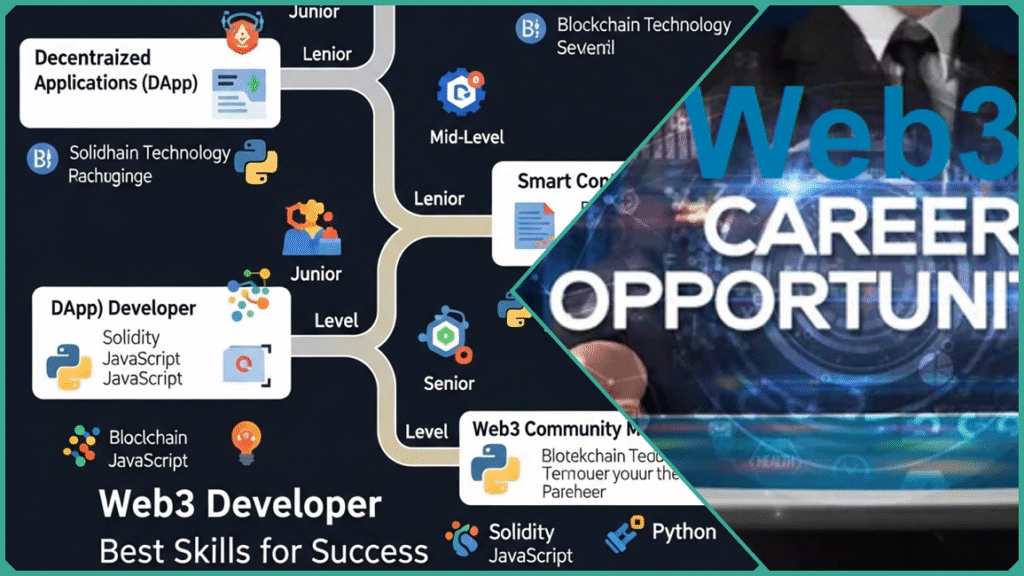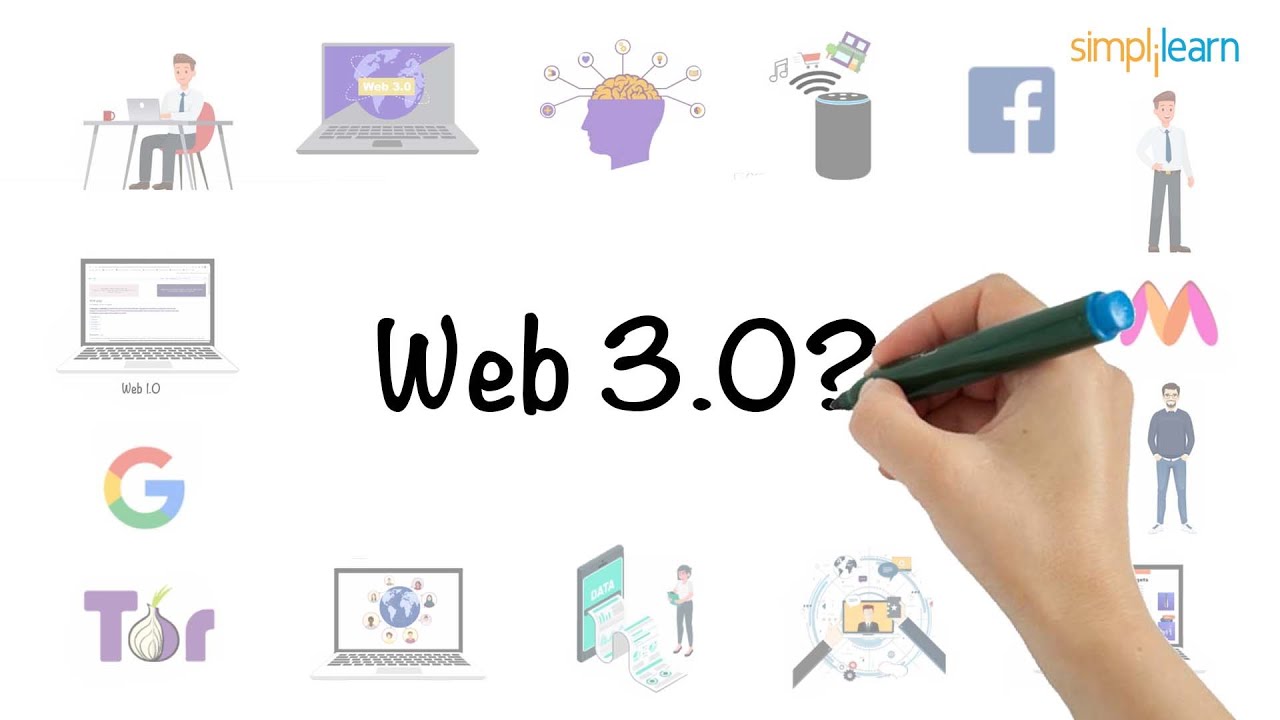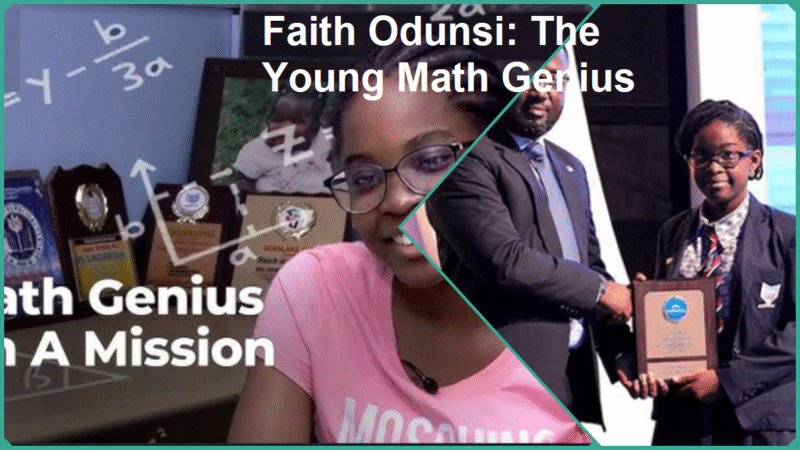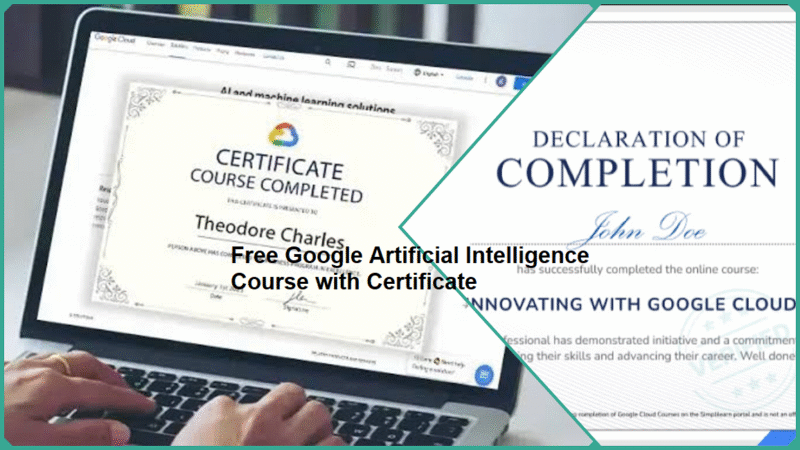Web3 Developer Career Paths and the Best Skills for Success
The internet is currently experiencing a monumental and transformative shift—from the traditional Web2 era characterized by centralized networks and controlled platforms, to the innovative and rapidly evolving realm of Web3, which is built upon decentralized, trustless infrastructure. This fundamental change is being driven by groundbreaking technologies such as blockchain, cryptocurrencies, and decentralized applications, all of which are fundamentally reshaping the ways in which we interact with and utilize technology daily.
Consequently, this paradigm shift has created an urgent and rapidly growing demand for highly skilled and knowledgeable Web3 developers who can navigate and build within this new decentralized digital landscape.

Navigating the complex and rapidly evolving landscape of Web3 developer career paths can be an overwhelming and challenging experience for a wide range of individuals, including students just starting, professionals looking to change careers, experienced Web2 developers transitioning to new technologies, and even career advisors who aim to provide accurate guidance.
This comprehensive guide thoroughly breaks down the essentials you need to know: the key roles within the field, the most in-demand skills that employers are looking for, the latest current industry trends shaping the landscape, and practical, actionable steps designed for anyone eager and motivated to play a part in shaping the future of the decentralized web.
Understanding Web3: Key Concepts
Web3, commonly referred to as “Web 3.0,” signifies a profound and fundamental transformation in the way the internet operates, focusing heavily on decentralization, the use of distributed ledger technologies, innovative token economies, and seamless direct peer-to-peer communication. This emerging paradigm challenges and disrupts the traditional centralized framework of Web2, setting new and groundbreaking standards for trust, transparency, and active user participation.
As a result, Web3 is not only reshaping how we develop and interact with technology but also creating a vast array of new and exciting career opportunities in various fields linked to this evolving digital landscape.
Core Principles of Web3 Development
Decentralization
- Data, power, and control are distributed and shared across a vast network, rather than being concentrated or held by a single entity or centralized authority. This decentralized arrangement ensures that no one individual or organization has complete dominance or exclusive control over the entire system.
- Anyone can contribute to or interact with the system, which significantly reduces the dependence on any single provider or entity. This inclusive approach ensures greater flexibility and resilience within the system.
Trustlessness
- There is no necessity for any central authority or intermediary to be involved in the validation of transactions or processes. This means that the verification and approval mechanisms operate in a decentralized manner without relying on a single controlling entity or third-party facilitator.
- Consensus mechanisms and carefully written code work together to establish and enforce a clear set of rules, ensuring that all participants and actors involved adhere strictly to the same agreed-upon standards and protocols throughout the entire system.
Transparency
- Public blockchains provide open access to all transactions and a significant portion of the codebase, allowing anyone to view, verify, and audit the activities and underlying software. This transparency ensures that every transaction is recorded on a public ledger, making the entire process accessible to users worldwide.
- Auditing, verification, and open scrutiny have increasingly become the established norm, significantly enhancing transparency, accountability, and overall security. These processes ensure that all actions and transactions are thoroughly examined and validated, fostering greater trust and confidence among stakeholders. As a result, organizations and systems benefit from improved oversight and reduced risks of errors or fraudulent activities.
Incentivization
- Crypto-tokens and staking mechanisms serve as powerful incentives that reward active participation, encourage continuous innovation, and promote effective governance within blockchain ecosystems. These systems are designed to motivate users to contribute meaningfully, support the network’s growth, and engage in decision-making processes that shape the future of decentralized platforms.
- New and innovative business models are now enabled, ranging from earning income through active participation in decentralized autonomous organizations (DAOs) to contributing valuable code and development work in exchange for cryptocurrency tokens. These models open up diverse opportunities for individuals to monetize their skills and involvement in decentralized ecosystems.
Top Web3 Developer Career Paths in 2025
As the Web3 ecosystem continues to evolve and mature at a remarkable pace, the range of career opportunities available for developers has expanded and diversified significantly. Today, there are specialized and highly interdisciplinary roles present at every layer of the decentralized technology stack, reflecting the complexity and innovation within the space.
Below, you will find a comprehensive and up-to-date breakdown of the leading Web3 developer career paths expected to be prominent in 2025. This overview includes detailed descriptions of various roles, their core responsibilities, and the best-fit professional backgrounds suited for each position.
| Role | Responsibilities | Best-Fit Background |
|---|---|---|
| Blockchain Developer | Build and optimize blockchain protocols and dApp infrastructures | Computer science, Web2 dev |
| Smart Contract Developer | Design, code, and audit self-executing contracts | Coding in Solidity/Rust |
| dApp Frontend Developer | Create user-facing components using Web3 integrations | JavaScript, React, UI/UX |
| Web3 Security Engineer | Audit code and ensure system security | Security, cryptography |
| Project Manager | Coordinate development, deployment, and iteration | Product/project management |
| Protocol Developer | Work on the underlying blockchain architecture | Advanced systems, cryptography |
| Community/Dev Evangelist | Grow, support, and educate developer communities | Teaching, communications |
| NFT/GameFi/DeFi Specialist | Build niche decentralized apps in gaming, finance, and marketplaces | Sector-specific experience |
Career Path Insights
Blockchain Developer
- Key Tasks: Architect blockchain platforms, implement consensus algorithms, maintain node software, and optimize scalability.
- Requirements: Deep understanding of distributed systems, proficiency in core languages like Solidity, Rust, Go, and in-demand frameworks (Ethereum, Solana, Polkadot).
Fit For: Software engineers who have a solid background in backend development or systems programming and possess a strong desire to create and build foundational protocols that serve as the backbone of modern technology. This opportunity is ideal for those looking to deepen their expertise and contribute to essential infrastructure in the software world.
Smart Contract Developer
- Key Tasks: Write, deploy, and audit smart contracts (automated, on-chain business logic).
- Requirements: Advanced coding skills in Solidity (Ethereum) or Rust (Solana), expertise in contract security, testing tools, and gas optimization.
Fit For: Developers who are deeply passionate about the intricate worlds of cryptography, finance, and high-stakes, mission-critical coding challenges. There is a strong and growing demand for these skills, especially within dynamic sectors like DeFi (Decentralized Finance), NFT (Non-Fungible Tokens), and DAO (Decentralized Autonomous Organizations) projects, where innovative coding expertise is essential.
dApp Frontend Developer
- Key Tasks: Design and build interactive web/app interfaces that connect to blockchains using Web3 APIs.
- Requirements: Proficiency with JavaScript, TypeScript, React.js, Ethers.js/Web3.js, and modern UI/UX practices.
Fit For: Web2 frontend developers who are eager to broaden their skill set by diving into the world of cryptocurrency, designers who possess coding abilities and want to enhance their technical expertise, as well as user experience experts looking to deepen their understanding and impact in the emerging crypto space.
Web3 Security Engineer
Key Tasks: Conduct code audits, penetration tests, and formal verifications to safeguard smart contracts and protocols.
Requirements: Strong background in cybersecurity, cryptographic algorithms, vulnerability analysis, and threat modeling.
Fit For: Security researchers, ethical hackers, and all professionals or enthusiasts who are dedicated to identifying vulnerabilities and mitigating risks within decentralized systems and blockchain technologies. This includes individuals committed to enhancing the security and integrity of distributed networks through thorough analysis and proactive defense strategies.
Project Manager
- Key Tasks: Manage cross-functional teams, set timelines, and lead Agile workflows for blockchain product releases.
- Requirements: Familiarity with decentralized governance, blockchain business models, and technical project management.
Fit For: Experienced product managers who have a strong interest in decentralized startups as well as open source ecosystems and are looking to expand their expertise in these innovative fields.
Protocol Developer
- Key Tasks: Build and refine core blockchain architectures—consensus mechanisms, networking layers, interoperability solutions.
- Requirements: Expert skills in algorithms, distributed computing, cryptography, and protocol design.
Fit For: Senior systems engineers, researchers, and computer scientists who possess a profound interest in the field of protocol innovation and are eager to explore and contribute to cutting-edge advancements in this area.
Community/Developer Evangelist
- Key Tasks: Build, educate, and support developer/user communities, lead workshops, create documentation, and advocate for adoption.
- Requirements: Strong communication skills, technical literacy, and experience moderating or growing online communities.
Fit For: Educators who are passionate about teaching, developer advocates looking to inspire and support their communities, or experienced open source veterans who have a deep understanding of collaborative software development.
NFT/GameFi/DeFi Specialist
- Key Tasks: Conceptualize, build, and launch niches such as NFT platforms, blockchain games, or decentralized finance platforms.
- Requirements: Blend of smart contract skills, product sense, and vertical-specific expertise (gaming, art, finance).
Fit For: Developers who have a strong passion and enthusiasm for working in creative industries or the fintech sector, and who ideally also bring valuable domain experience in these fields.
Additional Emerging Roles
- Decentralized Storage Developer: A professional who specializes in designing and integrating advanced decentralized storage solutions using cutting-edge systems such as IPFS, Filecoin, or Swarm. This developer focuses on creating efficient, secure, and scalable storage architectures that leverage blockchain technology and peer-to-peer networks to ensure data integrity and availability across distributed environments.
- DevOps/Infrastructure Engineer: Responsible for deploying and scaling blockchain nodes efficiently while managing and maintaining the distributed infrastructure that supports the entire blockchain network. This role involves ensuring the infrastructure is robust, secure, and capable of handling increasing workloads and traffic demands.
- Legal & Compliance Specialist: This role is dedicated to developing and overseeing regulatory strategies specifically tailored for tokens, smart contracts, and decentralized autonomous organizations (DAOs). The specialist ensures that all aspects comply with current laws and regulations, helping to navigate complex legal landscapes in the blockchain and cryptocurrency space.
- Blockchain Auditor: Responsible for conducting comprehensive technical and financial audits on various projects and smart contracts. This role involves thoroughly examining the code, security protocols, and financial transactions to ensure accuracy, transparency, and compliance with established standards and regulations. The auditor plays a critical role in identifying potential risks, vulnerabilities, and discrepancies to safeguard the integrity of blockchain applications and protect stakeholders’ interests.
In Summary
The Web3 ecosystem in 2025 presents a rich and diverse landscape filled with numerous opportunities for significant career growth and development. Developers and professionals can choose from a wide range of roles that span from highly technical positions involving blockchain engineering and smart contract development to more community-oriented roles focused on user engagement, education, and decentralized governance.
Many of these roles offer the added benefit of flexible work arrangements, including the ability to work remotely from anywhere in the world or to take on freelance projects that suit individual schedules and preferences.
By specializing in any of these promising career paths within the Web3 space, professionals position themselves at the very forefront of technological innovation, where demand for skilled talent remains exceptionally strong, salaries are highly competitive, and their work contributes directly to shaping and accelerating a rapidly evolving digital future that continues to expand and transform industries globally.
Remote and Freelance Opportunities in Web3
The decentralized nature of the Web3 ecosystem unlocks exceptional and unprecedented prospects for remote and freelance work opportunities, fundamentally transforming the way and the places where developers can build and advance their professional careers.
Here’s an in-depth look at how Web3 is actively making flexible work arrangements not only possible but rapidly becoming a mainstream and widely accepted norm in the industry.
Why Remote & Freelance Work Thrives in Web3
- Global Collaboration: Most Web3 teams and projects exist digitally first, often spread across continents. This infrastructure naturally enables remote participation, reducing geographic barriers for both employment and collaboration.
- DAO-Driven Hiring: Decentralized Autonomous Organizations (DAOs) replace traditional hierarchy with community-driven models. DAOs frequently hire contributors globally for short-term or continuous assignments, often voted in by the community or based on applicants’ demonstrated skills and contributions.
- Flexible Schedules: Without office constraints or rigid timetables, developers can set their work hours. This flexibility attracts self-starters and those seeking work-life balance or side projects.
- Crypto-First Compensation: Many roles, whether freelance or remote, are compensated in cryptocurrencies or tokens, offering early access to assets with growth potential and frictionless global payments.
Common Freelance & Remote Entry Points
| Method | Description | Benefits |
|---|---|---|
| Project-Based Contracts | Short- to mid-term gigs delivering specific smart contracts, integrations, or UI/UX features | Try various teams/projects |
| Open Source Contributions | Code, audit, or document in public repositories; highly visible and valued in Web3 | Build reputation; earn bounties |
| Hackathons | Competitive coding events to develop unique solutions over days or weeks | Network, win prizes, and gain recognition |
| Grant Programs | Ecosystem foundations and protocols fund individuals or teams to work on specific tools or features | Direct support for new ideas |
| Community Moderation/Support | Participate as a moderator, educator, or documentation writer in a protocol’s community channels | Grow soft skills; steady remote work |
Advantages for Developers
- Borderless Earning: No need to relocate; participate in global projects and get paid instantly in crypto or stablecoins.
- Portfolio Building: Open source and hackathon achievements create a public track record for future roles or contracts.
- Variety and Challenge: Freelancers frequently work across different blockchains, products, and communities, accelerating skill growth.
Examples of Remote-Friendly Web3 Organizations
- DAOs: MakerDAO, Uniswap, Aave, and Gitcoin attract contributors for engineering, community, and governance roles.
- Protocols & Ecosystems: Ethereum Foundation, Solana Labs, and Polygon support global teams and fund independent developers through grants and bounties.
- Platforms: Web3.career, CryptoJobsList, and Remote3.co curate remote-only Blockchain roles and freelance opportunities.
Tips to Succeed as a Remote Web3 Developer
- Contribute Publicly: Active GitHub, open source contributions, and communication in developer forums boost discoverability.
- Participate in Web3 Communities: Engage on Discord, Twitter, and DAO-specific platforms for visibility and collaboration.
- Document Your Work: Clear documentation, technical blogs, or recorded demos are crucial for remote teams and evidence of your expertise.
- Stay Adaptable: Rapid tech evolution means continued learning and agility are key to success and job security.
Remote and freelance work within the Web3 space is no longer considered a niche perk or an occasional benefit—rather, it has become the prevailing standard for a significant portion of the industry. As Decentralized Autonomous Organizations (DAOs) and various decentralized projects continue to expand rapidly, they are driving an increasing demand for skilled contributors.
This environment allows developers to create their unique career paths, manage and balance their work schedules flexibly, and actively engage in shaping the future of the internet. Importantly, all of this can be done without any constraints related to geographic location, enabling professionals to participate fully regardless of where they choose to live or work.
Skillset Breakdown: What Makes a Successful Web3 Developer?
The Web3 landscape is rapidly evolving at an unprecedented pace, requiring developers who are not only highly skilled and technically proficient but also adaptable, proactive, and deeply security-conscious. A successful Web3 developer thrives by striking a careful balance between advanced technical expertise and essential soft skills, which are crucial for fostering effective collaboration and driving innovation within decentralized, frequently remote-first work environments. T
hese combined abilities empower developers to navigate the complexities of the Web3 ecosystem with confidence and agility.
Technical (Hard) Skills
Blockchain Fundamentals
- Grasp consensus mechanisms (like Proof of Work and Proof of Stake).
- Understand distributed ledgers, tokenomics, blockchain data structures, and transaction lifecycles.
- Recognize the unique security and scalability challenges inherent to decentralized systems.
Smart Contract Development
- Master Solidity (Ethereum), Rust (Solana), Vyper, and move towards security-focused development patterns.
- Build, test, and deploy smart contracts while considering gas efficiency and minimizing attack surfaces.
- Develop expertise in smart contract auditing, using tools and methodologies to identify vulnerabilities—a top hiring requirement in DeFi and NFT development.
Web Development Proficiency
- Employ HTML, CSS, JavaScript, TypeScript, and frameworks such as React, Vue, or Node.js to craft seamless decentralized application (dApp) interfaces.
- Ensure the integration of frontend components with blockchain layers, utilizing specialized Web3 libraries (e.g., Ethers.js, Web3.js).
APIs and Node Management
- Interface with blockchain nodes through JSON-RPC, API endpoints, or bespoke SDKs.
- Manage servers or distributed infrastructure that interact with blockchain networks for backend processing or data indexing.
Cryptography
- Apply robust encryption, hashing, and digital signature algorithms to secure wallets, transactions, and user data.
- Understand private/public key management and be able to implement secure authentication flows.
Version Control & Collaboration
- Leverage Git for distributed version control and workflow management.
- Participate in open-source projects and DAOs, following standards for code reviews, issue tracking, and collaborative development.
Soft Skills
Continuous Learning
- Proactively stay abreast of new protocols, frameworks, and threats in the rapidly changing Web3 space.
- Cultivate a growth mindset through formal courses, self-study, and peer learning.
Problem Solving & Creativity
- Tackle unprecedented technical challenges—Web3 often involves unexplored territory, especially regarding scalability, interoperability, and user experience.
- Innovate around limitations by inventing new concepts or reimagining traditional solutions for decentralized models.
Time Management
- Excel in remote-first, sometimes asynchronous teams that require autonomy and disciplined task prioritization.
- Manage deadlines across short-term sprints, hackathons, or open-ended research projects.
Collaboration & Communication
- Contribute effectively to global, diverse teams using asynchronous chat, technical writing, and public discussions.
- Distill complex blockchain and cryptography concepts for cross-functional stakeholders or non-technical audiences.
Security Mindset
- Prioritize security at every stage; a single overlooked bug can have system-wide consequences, especially in smart contracts and on-chain logic.
- Adopt adversarial thinking and rigorous testing to minimize risk exposure and bolster trust in decentralized platforms.
Summary of the Core Skills for Web3 Developers
| Skill Area | Why It’s Essential | Common Tools/Languages |
|---|---|---|
| Blockchain Fundamentals | Ensures a robust understanding of decentralized ecosystems | Ethereum, Solana, Polkadot |
| Smart Contract Development | Delivers the logic at the heart of DeFi/NFTs/dApps | Solidity, Rust, Vyper |
| Web Development | Connects users to blockchain functionality | React, Vue, Node.js |
| Node/API Management | Powers backend interaction with blockchains | Ethers.js, Web3.js, JSON-RPC |
| Cryptography | Protects assets and data integrity | OpenSSL, Web Crypto APIs |
| Version Control | Enables distributed team collaboration | Git, GitHub, GitLab |
| Security Focus | Mitigates system-breaking vulnerabilities | MythX, Slither, OpenZeppelin |
| Communication | Facilitates teamwork and education in open communities | Slack, Discord, documentation |
Why These Skills Matter
- Employers seek developers who can learn and pivot quickly, communicate effectively in remote setups, and prioritize security as blockchain adoption spreads beyond finance into areas like gaming, supply chains, and healthcare.
- Industry leaders note that adaptability, open collaboration, and a robust security mindset are just as vital as writing flawless code.
- The best Web3 developers are not only excellent engineers—they are also educators, auditors, problem-solvers, and contributors to thriving open-source communities.
Developing this unique hybrid skillset empowers both new and transitioning developers to significantly stand out in the highly competitive yet increasingly opportunity-rich Web3 job market, giving them a distinct advantage in securing desirable roles.
Current Trends Shaping Web3 Developer Careers (2025)
Web3 continues to evolve at an incredibly rapid pace, significantly transforming the entire technology landscape while simultaneously creating a strong and growing demand for highly skilled professionals in this field.
Here are some of the pivotal and influential trends that are actively shaping the careers of Web3 developers in the year 2025:
Matured Blockchain Ecosystems
Leading blockchain networks such as Ethereum, Solana, and Polkadot are enhancing scalability and user experience. The adoption of layer-2 solutions, increased throughput, and improved developer tools has fostered a spike in decentralized application (dApp) development. This maturation leads to:
- More diverse and complex career roles, including protocol developers, smart contract security specialists, and blockchain data engineers.
- Higher-level integration skills, as cross-chain and interoperability, become essential for major dApp launches.
- Increased involvement from traditional institutions—often offering higher compensation—as blockchain infrastructure becomes mainstream.
AI & Web3 Convergence
Artificial intelligence and Web3 technologies are increasingly merging, creating a powerful synergy that drives innovation across multiple dimensions and industries. This convergence delivers:
- AI-powered smart contracts: Machine learning models analyze on-chain/off-chain data for dynamic contract behavior, enabling real-time decision-making and adaptive automation.
- Decentralized identity: AI enhances identity verification and management on-chain, improving security and user control over personal data.
- Personalized dApps: Intelligent applications adapt interfaces and services to individual user behaviors.
- AI in DAOs: Artificial Intelligence filters proposals, automates governance, and optimizes resource allocation in decentralized organizations.
For developers, this means that upskilling in both AI and blockchain technologies—or choosing to specialize specifically in the intersection where AI meets blockchain—can significantly unlock a wide range of high-demand job opportunities. As the number of AI+Web3 positions continues to rise sharply, professionals with expertise in these combined fields will find themselves in an increasingly advantageous position within the job market.
Mainstreaming of DeFi, NFTs, and Gaming
The rapid and remarkable expansion of DeFi (Decentralized Finance), NFTs (Non-Fungible Tokens), and blockchain-based gaming is continuously generating a wide array of significant and promising job opportunities across various sectors and industries.
This ongoing growth is opening up numerous career paths for professionals interested in cutting-edge technologies and innovative financial solutions.
- DeFi Developers: Skilled in protocol design, financial modeling, and security to build the future of decentralized finance.
- NFT & GameFi Specialists: Developers building NFT platforms or blockchain-based games leverage cross-domain knowledge in smart contracts, gaming logic, and digital marketplaces.
- Financial and creative hybrid roles: The interplay between technical development and creative sectors means new interdisciplinary positions are rapidly appearing.
Interoperability, user incentives, and player-owned economies are rapidly becoming essential standards within both the gaming and finance industries, significantly raising the expectations for industry expertise and adaptability.
These elements are no longer optional features but critical components that define the success and innovation of modern platforms, requiring professionals to continuously evolve their skills and strategies to keep pace with these dynamic trends.
Advanced Data Visualization
Modern decentralized applications (dApps) are increasingly dependent on sophisticated, real-time data visualizations to significantly enhance user decision-making processes and effectively demonstrate transparency. These advanced visual tools provide dynamic and interactive representations of complex data, enabling users to better understand trends, patterns, and key metrics as they happen.
By leveraging such cutting-edge visualization technologies, dApps can offer clearer insights and foster greater trust among users, ultimately supporting more informed and confident decisions in an ever-evolving digital environment.
- Developers must integrate front-end frameworks with real-time blockchain streams and analytics dashboards.
- Collaboration with designers and data scientists is essential to build an immersive, intuitive UI/UX.
- This trend especially impacts DeFi, gaming, and analytics tools, raising the need for developers who can bridge technical and visual domains.
Remote-First Work Culture
The deeply ingrained decentralized ethos that lies at the very core of Web3 fundamentally shapes and influences the unique work culture it fosters and promotes:
- Over 70% of Web3 roles are remote, with DAOs and blockchain firms hiring globally and compensating in crypto or tokens.
- Asynchronous workflows, self-discipline, and strong documentation practices are critical skills.
- Talent markets become borderless, increasing competition but also opening new pathways for global professionals, freelancers, and those outside traditional tech hubs.
Summary of the In-Demand Developer Roles & Driving Trends
| Trend | Key Developer Roles | Notable Skills Needed |
|---|---|---|
| Matured Blockchain | Protocol Dev, Cross-Chain Integration | Go, Solidity, Rust, cryptography |
| AI & Web3 | AI Smart Contract Dev, DeAI Specialist | ML frameworks, Solidity, and data science |
| DeFi/NFTs/Gaming | DeFi Dev, GameFi/NFT System Dev, Financial Analyst | Solidity, Game Engines, tokenomics |
| Data Visualization | dApp Frontend Dev, Data Engineer | React, Vue, Ethers.js, data viz tools |
| Remote-First Culture | All remote-friendly roles | Self-management, async comms, adaptability |
Key Takeaways
- Blended expertise (AI + blockchain) is increasingly valuable as intelligent, adaptive dApps become the next frontier.
- Multidisciplinary skill sets—spanning finance, game design, smart contracts, and UX/UI—are highly sought after in DeFi, NFT, and GameFi sectors.
- Opportunity is global: High flexibility, remote-first culture, and compensation in digital assets attract top talent regardless of location.
- Continuous learning and adaptability are essential, as rapid change in blockchain protocols, data needs, and collaborative practices define the field.
Staying ahead as a Web3 developer in 2025 involves continuously updating and expanding your skillset to remain relevant, while also staying open to a wide range of multidisciplinary opportunities that span various sectors. It means embracing and thriving in decentralized, remote-first work environments that are rapidly becoming the norm in the industry.
Roadmap to Launching a Web3 Developer Career
Choosing a career as a Web3 developer is an exceptionally smart and forward-thinking decision in today’s dynamic and rapidly expanding technology sector. This industry is evolving at an unprecedented pace, offering numerous exciting opportunities.
The following comprehensive roadmap offers a clear, detailed, and actionable guide designed specifically for individuals eager to enter this innovative field. Whether you are a complete newcomer just starting or an experienced developer aiming to pivot your skills into the Web3 space, this guide will help you navigate the essential steps and gain the knowledge necessary to succeed.
Learn the Fundamentals
- Understand Blockchain Basics: Grasp core concepts such as decentralization, distributed ledgers, consensus algorithms (Proof of Work, Proof of Stake), and cryptoeconomics.
- Explore Decentralized Ethos: Appreciate why Web3 shifts power from centralized entities to users, emphasizing transparency, incentivization, and trustlessness.
- Introductory Courses: Many top platforms offer beginner-friendly Web3 content, including:
- Alison’s free Web3 Marketing course
- Coursera and Udemy introductory blockchain tracks.
- Alchemy University, CryptoZombies for interactive smart contract tutorials.
- FreeCodeCamp articles and YouTube tutorials for foundational knowledge.
Choose Your Tech Stack
- Popular Protocols & Languages:
- Ethereum: Solidity is the dominant language for smart contracts. Best for DeFi and NFT projects.
- Solana: Rust is the primary language. This protocol is known for high-speed, low-cost transaction environments, often used in GameFi.
- Other Protocols: Polkadot (Rust), Avalanche, Near Protocol (AssemblyScript), and niche blockchains serving specialized markets.
- Industry Fit: Let your interests guide you:
- Finance: DeFi
- Creative industries: NFTs
- Gaming: GameFi.
Build Real Projects
- Apply Knowledge Practically:
- Start with guided tutorials and beginner dApp templates.
- Progress to your own unique dApps or smart contracts—this demonstrates initiative and creativity.
- Contribute to Open Source:
- Join active projects on GitHub—fix bugs, add features, and write documentation.
- Contributions are both learning opportunities and a way to build your reputation and expand your network.
- Portfolio Development:
- Link your public code, live demos, and project write-ups in your portfolio or technical blog.
Showcase and Network
- Technical Blog: Share learning journeys, problem-solving stories, and project breakdowns to attract attention from recruiters or collaborators.
- Public GitHub: Consistently update your repositories to showcase activity, code quality, and technical breadth.
- Hackathons: Participate in blockchain hackathons (virtual or in-person) to collaborate with teams, solve real challenges, and connect with employers.
- Community Engagement:
- Join Discord channels, Telegram groups, and DAOs related to your chosen protocol.
- Engage on Twitter, LinkedIn, and forum discussions to learn, contribute, and get noticed.
Get Certified (Optional) and Apply
- Certifications:
- Programs like Certified Web3 Blockchain Developer (CW3BD) or Blockchain Council credentials validate your expertise—helpful for career changers or those without formal education in crypto.
- Targeting Roles:
- Seek out entry-level positions, internships, or project-based contracts at startups, DAOs, or established organizations venturing into Web3.
- Platforms like Web3.career, CryptoJobsList, and Remote3.co list openings across technical and non-technical tracks.
- Contributing to grant-funded projects, bug bounties, or open-source initiatives can lead to direct job offers and lasting partnerships.
Success Tips
- Continuous Learning: The Web3 landscape evolves rapidly; keep up with protocol upgrades, new languages, and emerging dApp models.
- Security Awareness: Develop a security-first mindset. A single vulnerability in your code can have costly consequences in decentralized systems.
- Documentation: Write clear, thorough code and user documentation, both for your growth and future employers or collaborators.
- Resilience & Flexibility: Expect some failures and steep learning curves—growth comes from experimentation and persistence.
Summary of the Step-by-Step Roadmap to Launching a Web3 Developer Career
| Step | Action Points | Resources/Tools |
|---|---|---|
| Fundamentals | Learn blockchain theory & ethics | Alison, Coursera, Alchemy University |
| Tech Stack | Choose Ethereum, Solana, or other protocols | Solidity, Rust, protocol docs |
| Real Projects | Tutorials → Own dApp/Contracts → Open Source | GitHub, CryptoZombies, hackathons |
| Showcase | Blog, portfolio, open GitHub, networking | Earn credentials, apply for roles, and engage DAOs |
| Certify & Apply | Earn credentials, apply for roles, engage DAOs | CW3BD, CryptoJobsList, Web3.career |
Launching a career as a Web3 developer is an ongoing, iterative journey that involves continuously learning new skills, building innovative projects, connecting with a vibrant community, and actively applying your knowledge in real-world scenarios.
The benefits of pursuing this path are substantial and highly rewarding, including rapid industry growth, numerous flexible remote work opportunities, significant earning potential, and the unique chance to contribute to and shape the decentralized future of technology.
Case Study: From Web2 Developer to Web3 Engineer
Making the shift from traditional web development to the dynamic and rapidly evolving realm of Web3 is becoming more and more common, and equally, it is proving to be highly rewarding for many developers.
Sam’s journey, evolving from a Web2 frontend developer into a respected global Web3 engineering mentor, offers a clear and inspiring roadmap for anyone interested in making a similar career transition. His experience highlights the opportunities and challenges involved and serves as a valuable guide for those ready to embrace the future of web technology.
Sam’s Web2 Foundation
- Background: Frontend developer skilled in JavaScript and React.
- Strengths: Strong UI/UX knowledge, experience building interactive and scalable user interfaces, and familiarity with agile workflows.
- Motivation: A keen interest in decentralization and the transformative potential of blockchain technologies.
Taking the First Steps into Web3
- Identifying the Shift: Observing the momentum in the blockchain space convinced Sam that decentralization would play a major role in the future of tech careers.
- Learning the Basics: Began with Solidity—the leading language for Ethereum smart contracts—using online tutorials and interactive platforms tailored for beginners.
- Building Simple Contracts: Developed test projects on the Ethereum testnet, such as basic token contracts, to understand transaction flows, gas fees, and smart contract deployment.
Gaining Real-World Experience
- Open Source Contribution: Sam found an open-source NFT marketplace project on GitHub. By fixing bugs and adding minor features, Sam:
- Gained hands-on experience with blockchain data management and event handling.
- Learned how dApps integrate frontend interfaces with underlying smart contracts.
- Built credibility within the developer community.
- Networking: Engaged with project maintainers, participated in community discussions, and documented his journey in a technical blog, helping Sam get noticed by recruiters and peers.
Breaking Into Professional Web3 Roles
- First Contract Role: Sam’s open-source reputation led to a remote contract offer: writing and auditing smart contracts for a DeFi platform.
- Key Responsibilities:
- Building secure, modular smart contracts for complex financial operations.
- Collaborating with globally distributed teams via asynchronous communication tools.
- Proactively identifying and fixing vulnerabilities—a must in DeFi.
- Skill Growth: Rapid upskilling in Solidity, DeFi architecture, cryptography basics, and blockchain best practices. Project-based learning replaced traditional, slow-moving enterprise environments.
Accelerating Career Growth
- Progression to Lead Developer: Within two years, Sam moved from individual contributor to lead developer, overseeing teams that built and deployed decentralized applications at scale.
- Mentorship:
- Led onboarding sessions for junior engineers worldwide.
- Authored documentation and guides for best smart contract practices.
- Advocated for open knowledge sharing in Web3 forums and DAOs.
What Sam’s Story Demonstrates
- Transferability of Classic Development Skills
- Web2 Frontend Experience: Deep understanding of JavaScript, UX/UI, and agile workflows made learning dApp development smoother.
- Problem-Solving and Collaboration: Skills honed in Web2 projects remain crucial in Web3, especially for open-source and remote roles.
- Abundance of Opportunity in Web3
- Low Entry Barrier: Hands-on projects and open-source contributions often matter more than formal credentials.
- Global, Remote Access: DAOs, startups, and blockchain orgs recruit talent from anywhere, valuing proven impact over location.
- Fast-Paced Growth: The Web3 sector rewards adaptability and permits accelerated career growth for those who keep learning.
Key Strategies for Aspiring Web2-to-Web3 Developers
- Start With What You Know: Apply JavaScript/React proficiency to Web3 frontend frameworks and dApps.
- Hands-On Learning: Build, break, and fix smart contracts on testnets.
- Open Source First: Tackle real-world codebases for credibility and networking.
- Document and Share: Maintain a public portfolio and share experiences via blogs or community posts.
- Network in Web3 Communities: Join Discord groups, DAOs, and participate in hackathons.
Takeaway
Sam’s journey stands as a powerful testament to how foundational web development skills remain not only highly relevant but also incredibly advantageous in the rapidly evolving world of Web3. The key to success lies in a strong willingness to learn and embrace new technologies, actively contribute to open-source projects, and engage deeply with the vibrant community.
These efforts can unlock opportunities for rapid career advancement and enable individuals to make a meaningful, lasting impact within the decentralized technology landscape.
Whether you are a junior developer just starting or a seasoned Web2 engineer with years of experience, the future of Web3 warmly welcomes your expertise, provided you approach it with curiosity, proactivity, and a readiness to adapt to the ever-changing environment.
FAQs
Is the Web3 Job Market Stable or Risky?
While cryptocurrency markets can experience significant volatility, the demand for skilled Web3 developers remains robust. Industries such as supply chain management, gaming, healthcare, and logistics are increasingly adopting blockchain technology, which underpins job security and growth for developers in this space. The market’s stability is tied less to crypto price swings and more to the broader move toward decentralized technologies across sectors.
What Programming Languages Should I Learn?
- Solidity: Essential for Ethereum and compatible blockchains; the most widely used smart contract language.
- Rust: Key for developing on platforms like Solana and Polkadot, prized for performance and security.
- JavaScript/TypeScript: Vital for creating decentralized application (dApp) interfaces.
- Python: Useful for backend integration, data analysis, and scripting.
- Vyper: An alternative to Solidity on Ethereum, focusing on simplicity and security.
Learning these languages will provide you with the essential skills needed to work effectively across the majority of leading blockchain platforms and their diverse, associated application ecosystems. This knowledge will enable you to develop, deploy, and manage applications on multiple blockchain networks, thereby significantly expanding your opportunities in the rapidly evolving blockchain industry.
Do I Need a Computer Science Degree?
Having a computer science degree can certainly be advantageous and provide a solid foundation, but it is not an absolute or strict requirement for getting started or progressing further in the field of Web3 development. Many employers and organizations within this rapidly evolving sector place greater emphasis on:
- Strong practical skills in relevant programming languages
- A robust portfolio showcasing real projects (dApps, smart contracts, open-source contributions)
- Evidence of participation in hackathons, online communities, or open-source projects
Performance and demonstrated skills frequently carry more weight than formal education credentials, particularly when it comes to remote-first organizations and fast-growing startup companies. In these environments, the ability to deliver tangible results and showcase practical expertise often proves to be more valuable than traditional degrees or certifications.
Can Existing Web2 Developers Transition Easily to Web3?
Web2 developers possess a substantial head start due to their extensive existing knowledge and experience in areas such as:
- JavaScript and front-end frameworks (React, Vue)
- Backend development (Node.js, RESTful APIs)
- DevOps practices and testing frameworks
The primary adjustment lies in gaining a firm grasp of blockchain architecture and smart contract development, but many concepts such as user authentication, state management, and code review remain highly relevant. Many Web2 developers successfully transitioned by learning Solidity or Rust and building sample projects or contributing to open-source Web3 initiatives.
Are There Remote or Global Work Opportunities?
The Web3 industry is highly remote-friendly. Decentralized Autonomous Organizations (DAOs), global blockchain startups, and established tech firms increasingly operate with distributed teams. Compensation is frequently offered in both fiat and cryptocurrencies or project tokens, and roles are open to candidates worldwide, supporting flexible schedules and borderless collaboration.
In Conclusion
Choosing a Web3 developer career is an investment in high growth, innovation, and meaningful impact within the technology sector. Whether you’re just starting, transitioning from Web2, or guiding others as a mentor or advisor, the decentralized internet offers a wealth of opportunities and an exciting professional journey. Here’s what sets successful Web3 developers apart:
- Solid grounding in blockchain fundamentals and smart contract development: Mastery in these areas forms the backbone of all Web3 projects, from decentralized finance to NFTs and gaming platforms.
- Adaptation of traditional web development skills: Skills in JavaScript, UI/UX, and backend development remain invaluable, but require adaptation to decentralized tech stacks and the unique challenges of trustless environments.
- Commitment to continuous learning and global collaboration: The Web3 landscape evolves rapidly. Staying curious, learning new protocols, and engaging in international communities are vital for long-term relevance and satisfaction.
No matter your background, the Web3 field rewards initiative, creativity, and a collaborative spirit. By engaging with its communities, building real projects, and keeping your skillset sharp, you can shape not just your career but the very foundations of tomorrow’s decentralized web.
Become the visionary architect of tomorrow’s digital world—embrace a rewarding and innovative Web3 developer career path starting today and shape the future of technology.







